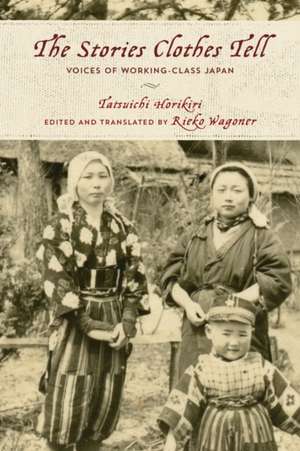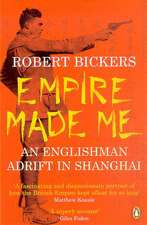The Stories Clothes Tell: Asian Voices
Autor Tatsuichi Horikiri Traducere de Rieko Wagoneren Limba Engleză Paperback – 15 apr 2016
Din seria Asian Voices
- 19%
 Preț: 417.82 lei
Preț: 417.82 lei -
 Preț: 246.27 lei
Preț: 246.27 lei -
 Preț: 517.15 lei
Preț: 517.15 lei -
 Preț: 516.77 lei
Preț: 516.77 lei -
 Preț: 414.79 lei
Preț: 414.79 lei -
 Preț: 434.26 lei
Preț: 434.26 lei -
 Preț: 445.28 lei
Preț: 445.28 lei -
 Preț: 373.47 lei
Preț: 373.47 lei -
 Preț: 410.12 lei
Preț: 410.12 lei -
 Preț: 409.14 lei
Preț: 409.14 lei -
 Preț: 386.89 lei
Preț: 386.89 lei -
 Preț: 315.20 lei
Preț: 315.20 lei -
 Preț: 233.98 lei
Preț: 233.98 lei -
 Preț: 387.26 lei
Preț: 387.26 lei -
 Preț: 314.82 lei
Preț: 314.82 lei -
 Preț: 316.77 lei
Preț: 316.77 lei -
 Preț: 296.34 lei
Preț: 296.34 lei -
 Preț: 278.53 lei
Preț: 278.53 lei -
 Preț: 267.13 lei
Preț: 267.13 lei -
 Preț: 317.92 lei
Preț: 317.92 lei -
 Preț: 290.02 lei
Preț: 290.02 lei -
 Preț: 420.26 lei
Preț: 420.26 lei -
 Preț: 419.28 lei
Preț: 419.28 lei - 23%
 Preț: 423.15 lei
Preț: 423.15 lei - 27%
 Preț: 730.75 lei
Preț: 730.75 lei -
 Preț: 442.53 lei
Preț: 442.53 lei -
 Preț: 281.05 lei
Preț: 281.05 lei -
 Preț: 417.81 lei
Preț: 417.81 lei -
 Preț: 430.34 lei
Preț: 430.34 lei - 12%
 Preț: 105.84 lei
Preț: 105.84 lei - 17%
 Preț: 84.16 lei
Preț: 84.16 lei
Preț: 343.41 lei
Nou
Puncte Express: 515
Preț estimativ în valută:
65.71€ • 70.27$ • 54.79£
65.71€ • 70.27$ • 54.79£
Carte tipărită la comandă
Livrare economică 17 aprilie-01 mai
Preluare comenzi: 021 569.72.76
Specificații
ISBN-13: 9781442265103
ISBN-10: 1442265108
Pagini: 206
Dimensiuni: 152 x 226 x 15 mm
Greutate: 0.32 kg
Editura: Rowman & Littlefield
Seria Asian Voices
ISBN-10: 1442265108
Pagini: 206
Dimensiuni: 152 x 226 x 15 mm
Greutate: 0.32 kg
Editura: Rowman & Littlefield
Seria Asian Voices
Notă biografică
By Tatsuichi Horikiri - Translated by Rieko Wagoner
Descriere
This compelling social history tells the stories of ordinary people in modern Japan. Tatsuichi Horikiri spent a lifetime searching out old items of clothing and oral accounts to shed light on those who used these items. He illuminates not only the often desperate lives of these people but also their hopes, aspirations, and human values.












